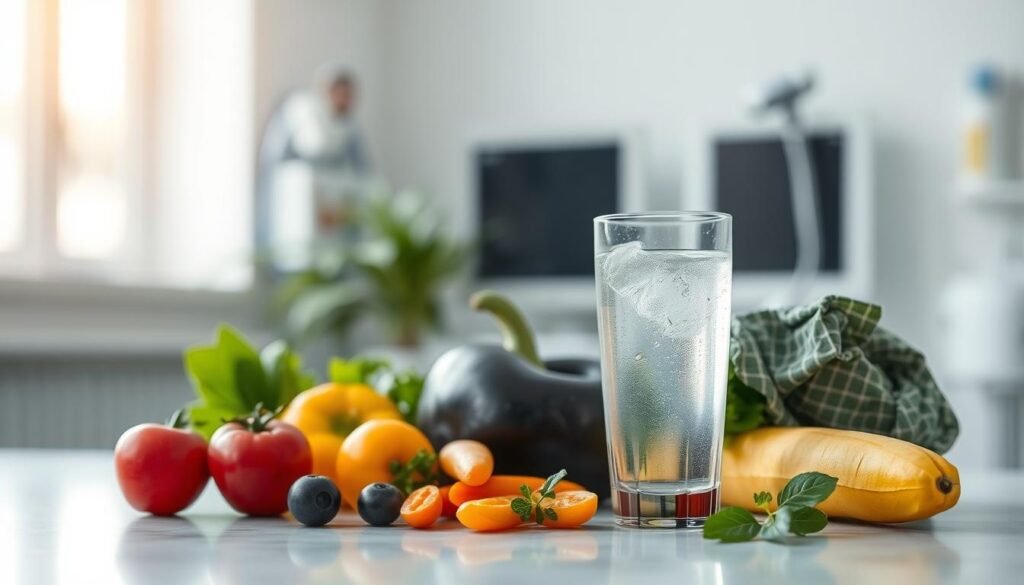Did you know that up to 70% of cancer patients face dehydration during treatment? Keeping hydrated during lung cancer care is crucial. It helps manage side effects and improves wellness and health. Knowing how important it is to drink enough fluids is key when dealing with lung cancer treatment.
Hydration can ease the side effects of medications and treatments. It leads to a better recovery journey. This article looks at how staying hydrated helps with cancer care. It gives tips on keeping up with fluid intake when it’s hard. For more tips, please see staying hydrated during treatment.
Key Takeaways
- Dehydration affects up to 70% of cancer patients during treatment.
- Hydration plays a crucial role in managing treatment side effects.
- Proper fluid intake enhances overall patient wellness.
- Understanding hydration’s importance is vital for effective cancer care.
- Staying hydrated can significantly improve recovery and quality of life.
The Importance of Hydration in Cancer Treatment
Staying hydrated is very important for those battling cancer, especially with lung cancer. It’s crucial when going through tough treatments like chemotherapy or radiation. Water helps with absorbing nutrients, keeping the body cool, and getting rid of wastes. These needs are even more critical during cancer treatments.
Water intake is key to feeling more energetic during cancer therapy. Patients who drink enough water face fewer side effects. They find it easier to handle therapy. Drinking plenty of water also speeds up recovery. It helps the body deal with treatments and heal faster.
| Hydration Benefits | Description |
|---|---|
| Nutrient Absorption | Facilitates the body’s ability to absorb essential vitamins and minerals. |
| Temperature Regulation | Helps in maintaining a stable body temperature despite treatment side effects. |
| Waste Elimination | Supports the efficient removal of toxins and waste products from the body. |
| Energy Maintenance | Contributes to sustained energy levels, aiding patients during treatment fatigue. |
Overall, focusing on hydration is essential in cancer care. It helps patients manage their health better. And it makes their treatments more effective.
Understanding the Effects of Lung Cancer Treatment on the Body
Lung cancer treatments like chemotherapy, radiation, and surgery have a big impact. They can cause nausea, vomiting, and less hunger. This makes hydration super important for patients dealing with lung cancer.
Not drinking enough water can make other health problems worse. It can make you feel tired and uncomfortable. Drinking plenty of liquids helps lessen these bad effects. It’s important to know when you’re getting dehydrated.
Check out this table to see how treatments for lung cancer might make you dehydrated:
| Treatment Type | Common Side Effects | Dehydration Risk |
|---|---|---|
| Chemotherapy | Nausea, vomiting, diarrhea | High |
| Radiation Therapy | Fatigue, dry mouth, changes in taste | Moderate |
| Surgery | Pain, decreased appetite | Moderate |
Staying hydrated is key during lung cancer treatment. It helps with comfort and energy. And it’s vital for recovery during such a challenging time.
Staying Hydrated During Lung Cancer Treatment
Getting enough fluids is key when you’re fighting lung cancer. Keeping hydrated helps ease tiredness and constipation. If you don’t drink enough, these issues can get worse. That’s why having plenty of fluids is crucial for patients.
Hydration’s Role in Symptom Management
When getting treated, patients may feel very thirsty, tired, and have trouble going to the bathroom. Drinking plenty of water helps make these symptoms less bothersome. It keeps your digestive system running smoothly, easing constipation.
Also, staying hydrated boosts your energy. This helps patients feel better and live more comfortably while undergoing treatment.
Link Between Hydration and Treatment Efficacy
Being well-hydrated also makes cancer treatments work better. Enough fluids mean medications are absorbed well, improving how well these treatments work. Avoiding dehydration is crucial.
Not drinking enough can interfere with chemotherapy. However, patients who drink enough fluids report fewer side effects and better health throughout their treatment.
Lung Cancer Hydration Tips for Patients
Keeping hydrated during lung cancer treatment is key for good health and comfort. Here are useful tips for lung cancer patients. These tips make managing your hydration easier.
Choosing the Right Fluids
It’s important to pick drinks that hydrate you without bad effects. The best options are:
- Water – It’s crucial for staying hydrated.
- Herbal teas – These are comforting and can be had hot or cold.
- Broths – Full of nutrients and good for hydration, great for those on chemotherapy.
Avoid drinks with caffeine or lots of sugar. They can make dehydration worse. They might also affect how well hydration works with chemotherapy for lung cancer patients.
How to Integrate Hydration into Your Daily Routine
For consistent hydration, try these tips:
- Set reminders to drink water regularly.
- Always have a water bottle with you to sip all day.
- Eat soups or fruits with high water content during meals.
These steps are key to staying hydrated. They help lung cancer patients feel their best while on treatment.

Recognizing Signs of Dehydration
Spotting dehydration in cancer patients is key, especially with treatments like lung cancer therapy. Knowing these signs helps act quickly, improving patient health. Symptoms of dehydration include:
- Dry mouth: Often the first sign of needing more water, making one feel uncomfortable.
- Fatigue: Happens when essential fluids are low, affecting one’s energy.
- Dizziness: Common when not drinking enough fluids.
- Reduced urine output: Less urine can mean dehydration.
It’s vital to recognize these warning signs during lung cancer treatment. Patients and those caring for them should keep an eye out. Early spotting of these symptoms means quicker responses, like drinking more or getting medical advice.
Staying Hydrated with Chemotherapy for Lung Cancer
Staying hydrated is crucial when you have lung cancer and are undergoing chemotherapy. It helps manage side effects and keeps you healthy. Chemotherapy impacts how your body handles fluids due to changes in metabolism. It can also lead to more fluid loss through symptoms like vomiting and diarrhea.
Impact of Chemotherapy on Fluid Needs
It’s critical to understand your hydration needs during chemotherapy. Dehydration can make the treatment harder to tolerate. Several factors can increase your body’s need for fluids during this time:
- Increased Vomiting: Chemotherapy might cause nausea and vomiting, which leads to losing a lot of fluid.
- Diarrhea: Certain chemotherapy drugs can cause diarrhea, speeding up the loss of fluids.
- Altered Metabolism: Chemotherapy can affect how your body processes fluids, making you feel thirstier.
- Reduced Appetite: With less appetite, you might not consume as many fluid-containing foods.
Considering these factors, creating a personalized hydration plan is important. Staying properly hydrated helps you handle side effects better and can even improve the effectiveness of your treatment. Keeping an eye on how much you drink and making sure you’re getting enough fluids can make a big difference in your comfort and healing process.
| Hydration Strategies | Benefits |
|---|---|
| Drink water regularly throughout the day | Helps in maintaining fluid balance |
| Include electrolyte-rich fluids | Replenishes lost minerals and aids hydration |
| Eat water-rich foods (e.g., fruits and vegetables) | Provides hydration along with essential nutrients |
| Monitor symptoms of dehydration | Helps in identifying hydration needs proactively |

The Role of Nutrition in Maintaining Hydration
Nutrition is key for keeping hydrated, especially in lung cancer patients. Staying well-hydrated is crucial during lung cancer treatment. It helps maintain overall health. Adding certain foods to one’s diet can boost hydration and provide needed nutrients.
Foods High in Water Content
Cancer patients should eat foods that are rich in water. These foods help with hydration and offer extra nutrition. Some top choices include:
- Cucumbers: Almost 95% water, cucumbers are great for hydration.
- Watermelon: With about 92% water, it’s a hydrating fruit.
- Oranges: They’re not just high in vitamin C but are also more than 85% water.
- Strawberries: Containing around 91% water, strawberries are both delicious and hydrating.
- Soups and broths: Soups help increase hydration while providing comfort.
Adding foods with lots of water to your daily meals can help hit hydration targets. This strategy supports regular ways to stay hydrated. It ensures patients keep hydrated and healthy whilst undergoing lung cancer treatment.
Managing Dehydration During Lung Cancer
Having effective strategies is key in tackling dehydration for lung cancer patients. Simple actions can help keep hydration levels up, aiding their health during treatment.
Practical Strategies for Prevention
Starting a hydration routine can really help. Here’s what lung cancer patients can do:
- Set hydration goals: It’s good to aim for a certain amount of fluids each day.
- Use reminders: Apps or alarms on smartphones remind patients to drink regularly.
- Encourage supportive care: Talking about hydration with doctors helps with fluid intake management.
- Carry water bottles: Refillable bottles ensure patients drink water throughout the day.
When to Seek Medical Advice
Knowing when to see a doctor is crucial. Look out for these signs:
- Persistent dry mouth or always feeling thirsty.
- Not peeing much or if pee is dark.
- Feeling dizzy or light-headed.
- Being tired or weak.
Lung cancer patients can manage dehydration by using these strategies. This improves their treatment and general health.
Hydration and Quality of Life During Treatment
Keeping hydrated is very important for those undergoing lung cancer treatment. It greatly improves life quality. Being well-hydrated helps patients feel better emotionally. They tend to be more positive and can deal with challenges better.
Emotional Well-being and Hydration
Hydration impacts both body and mind. Those in treatment often feel tired, worried, and sad. Drinking enough fluids can lessen these bad feelings and boost happiness. It fights tiredness and increases energy. This can make patients feel more in control.
Being hydrated also means thinking more clearly and staying focused. This helps patients stick to their treatment plans. When they’re emotionally better, staying optimistic becomes easier. Understanding the link between hydration and feeling good is key. It helps patients care for themselves in a full way.
Expert Opinions on Hydration in Cancer Care
Staying hydrated is key during lung cancer treatment. Oncologists and nutritionists say it’s vital for good outcomes. They note that a smart fluid strategy helps with side effects.

Specialists say cancer patients should drink at least eight glasses of fluids a day. It’s vital to keep track, as everyone’s needs are different. Without enough water, there can be complications that harm the body’s function.
Advice from Oncologists and Nutritionists
Nutrition experts suggest adding various drinks like water, herbal teas, and broths. Avoid too much caffeine and alcohol because they dry you out. Oncologists tell patients to look out for signs like dry mouth, dizziness, or dark urine. These signs might mean you need more water or even a doctor’s help. Preventing dehydration is key in lung cancer treatment. It makes life better.
To wrap it up, staying ahead with your hydration is a big deal. Following these tips makes treatment easier. It lets patients focus on getting better, free from the troubles of dehydration.
Conclusion
Keeping hydrated during lung cancer treatment is key to feeling better and handling side effects well. Drinking enough water helps ease tough symptoms like tiredness, feeling sick, and dry mouth. These issues greatly affect life quality during this hard time.
Patients should make drinking water a regular part of their day to improve their treatment experience. For example, setting drink reminders or enjoying tasty drinks like coconut water can help. Learn more about good drink choices by checking hydration choices.
Making sure to drink enough is important for overall care. By staying informed and focused on staying hydrated, patients can take control of their health. This results in better health outcomes during their treatment. For more info, see care strategies specifically for lung cancer patients.